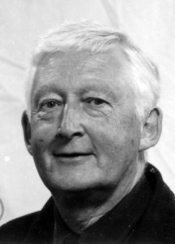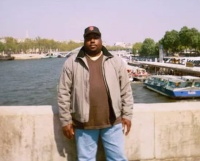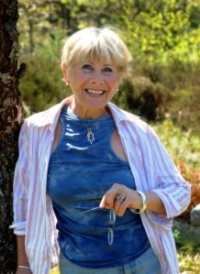.
.
.
.
Found in a Jam Jar
.
In a large jam jar, sealed and cast off
from the Welsh coast in 1964
and found now in Tilbury, shall we say,
or Southampton, a set of objects.
Two cinema stubs, at one-and-nine,
a Press cutting, Jazz on a Summer’s Day,
two cards for folk club membership,
a plectrum for guitar, sheet music,
Seeger, We Shall Overcome. Then
a message, a declaration really:
We are going forward. We are strumming
the bright rhythms of sex, the sounds
of brotherhood and love. Whether
our message will be heard in Cabinets
and coalfields, as yet we do not know.
But we know that tonight the street
to the folk club is busy with moonlight,
that people are arriving hand in hand.
The plectra will strum those strings,
we shall hear the songs’ clarion, and we,
moon-lit, hand-holding, a duet,
believe these things implicitly.
.
*
.
by Robert Nisbet (first published in Poetry Wales)
.
.
___
.
.
…………………………TRUMPET
…………………………..JUMPIN’
.
in smoke…………………………………. the beat
filled room……………………………… arms wavin’
crowd callin’…………………………….high overhead
the name…………………………………now creepin’
of joy………………………………………..to bass
exuberant buzz………………………..riffs finger
of voices…………………………………. poppin’ good
the drums………………………………..and here
wicked comments……………………we go
provokin’ laughter……………………the piano
the piano…………………………………leads all
stompin’ glee-………………………..back into
fully sax………………………………….the dance
ballin’ the……………………………….moanin’ with
jack someone…………………………pleasure moanin’
called the……………………………….goodtime blues
police arrived………………………..man don’t
disarmed by………………………….stop now…
.
*
.
by Michael L. Newell
.
.
___
.
.
A lesson in Scat
(for Ella Fitzgerald)
Sort your syllables by sound,
Articulate, accentuate,
Demonstrate and syncopate !
Co-ordinate your cadence,
Keep your verbs in motion,
Delivery precise,
Draw out the vowels,
Set aside the syntax,
Reiterate the rhythm,
Take your stance,
Lean in,
And swing !
.
*
.
by Freddington
.
.
___
.
.
Dream A Little Dream
A woman sits a few
Rows down, engrossed
In a book, in a coffeehouse
I could become engrossed
In her, as I am in the movie
I’m watching: the film is about
a man falling for a married woman
The woman sitting a few rows
Down, has legs as long
As dreams
And I wouldn’t care if she
Didn’t like jazz
Her long legs would be
All the music she needed
To be for me
Like Odysseus, I follow
The siren’s call into
Dreams
.
*
.
by Erren Kelly
.
.
___
.
.
Things He Gave Me
He gave me his copy of Charles Lloyd’s
Forest Flower, said he knew this Cat in high
school before he went to Viet Nam, I was
impressed as we sat on the floor drinking
White Port and lemon juice, teaching me
something new, another vibe another groove
There’s a shakuhachi flute I never learned to play
now sits secure in my bedroom, it’s bamboo split
from years of decay having been left discarded in the
garage because he had gone away, a visual reminder
that made me cry, some days wanting to die
Three books by Kahlil Gibran, Thoughts and Meditations
The Voice of the Master, The Broken Wings, as mine
when he said goodbye, I’ve yet to read them, they too
caused me to cry, now sitting in a drawer, among the
things he gave to me
Years later he sent a collection of CDs, his own music
he didn’t know I had bought some on my own when
he still played the cornet, he became a conductor whose
music I didn’t understand, these too treasured away
the essence of my love for him, perhaps we’ll meet again
he’ll give himself to me and he’ll be mine
.
*
.
by Aurora Lewis
.
.
___
.
.
” to woodshed “
” if you don’t live it,
it won’t come out
of your horn”
– Charlie Parker
…..Some folks are so far-out there
…..we just cannot live like them
…..instead, we get real good on
…..using imagery and metaphors
…..when nailing down words
…..about walking the line
…..even without doing so.
.
*
.
by Anggo Genorga
.
.
___
.
.
Cracked Ceilings
………………………...( for Albert Ayler 1936-1970 )
Cracked ceilings
through rooftops of time
inevitable light tinged blue
marching toward infinite oneness
no obols needed
even Charon transfixed
people caught in nets of sound
all pain and suffering distilled
crescendo
catharsis
search for the mythos
word!
cyclical and linear
cosmological
aural ontogeny
Cleveland sun
falling through the waters
an overblowing hiss
reverbs
in the ever now
ecstatic
sobbing
emanence
sound!
like a summer day
on Mt. Pleasant
a love cry
out past days to come
lost music of the Greeks
cymbals clang
horns wail
Cybele worship howl
of eunuch devotees
reed man Moses
of the promised land
leaving soul impressions
like a negative
instamatic revelation
burned in the ear
a Joshua
attacking Jericho mind walls
slow to crumble
you soldiered on
divining the forms
underlying everything
voyaging in time and space
on a ship called feeling
like some huge outer planet
you walked your Clevelands
like a dervish
always facing truth
a lightning rod of thunder
calling the congregation
oh, green leather suited
troubadour of Zion
your programme
to expand the perfect number
of the redeemed
wandering preacher
speaking in tongues
musical snake handler
shouting sound salvation
a dove ascending
out of chaos
too stunned
the audience never danced
Shiva-like
deaf to your naked soul
and the lost sounds
whale songs
humming-bird heartbeats
cosmic vibrato of a single cell
washed in an East River font
no witnesses to your aura
Cleveland son
into the waters
beyond all misunderstandings
no ceiling music
with Gabriel filling in for Donald
and more than a few harp players
some cats who KNOW
that’s right
really know
what you were talkin’ about
.
*
.
by dan smith (previously published on the CD, Matinee Motel)
.
.
___
.
.
Night and Day
In the key of D
250 on the metronome
a gallop
too fast for this guitar cowboy
but is it D Major
or D Minor
I wonder?
F for a while on the bridge
the GPS
like a bullet kicking up snow
and no strays
just a gray area here on the trail
in January
but Cole Porter is thinking of me
I can tell
there’s no right or wrong
in the saddle
the notes are just math
isn’t that what Monk said?
and the Law of Motion keeps going on and on
so
after you hurrah the town
skip ahead like Tal Farlow
like the luminous great horse burning the barn
where Bird lives
just don’t forget to say thanks
.
*
.
by John Stupp
.
.
___
.
.
TWO WHO HAVE SEEN BETTER DAYS
Exuberant rain dances on a spring window
in concert with Ramsey Lewis unleashing
“Hang on Sloopy” on the radio;
who would have thought it possible
piano, rain, and wind might lift an old man
to his feet in an aging parody of a jig;
the septuagenarian’s ragged voice belts out
those words that can be remembered while
the visitor in the room, an old friend unseen
for years, sings along, misses as many words
as his host in a wild unanticipated toast to life;
neither of these old scoundrels are fit to dance,
much less sing, but both give it all they got, as wind
rises and falls, as rain sweeps away lost and lonely years,
as life flowers in the most unlikely of crucibles.
.
*
.
by Michael L. Newell
.
.
___
.
.
Starting Out Of Time
I must start out of tempo,
Sometimes getting lost.
But after hours and many tries
At thoughts and skills and inner ties,
An inner eye will clarify;
The thing is fostered, building up;
Lost gets tossed, then lost gets lost.
At seemingly no cost. Rubato
Takes up speed,
Which leads to something it itself
Can breed. Ideas appear.
Indeed, ideas cohere
In fullness and in form, informed
By sheer reflection; sheer and clear,
Like glass through which one sees, gets seen.
Jazz musicians have the key—
And those who master Zen.
I must start out of tempo,
Let the hand say when.
When I get lost, it can be years
Before I’m back on track.
But after years of lies and tries
The tempo builds up speed
As if and of itself, the seed
Of spontaneity has cracked,
Sprouting, spurting, spuming out
A finished, polished thing with clout.
.
*
.
by Arlene Corwin
.
.
___
.
.
Joplin Mania
Great Scott! I feel uplifted by your rags.
Not the ones concealed in garbage bags,
discretely tied so they seem nice and neat.
but those protruding from a measured beat.
And I’m amazed you’d flippantly throw out
melodic jewels, whose preciousness I tout
has all the clout that fills a Mozart strain
with logic it seems only gods ordain.
What tuneful threads you weave through hand me downs,
whose cleft notes march to syncopated sounds;
fleet fugitives from their 2/4 time.
Were ever rag infusions more sublime?
For woven thus into a formal coat
they give their trappings even greater note.
.
*
.
by Frank De Canio
.
.
___
.
.
The Late Twenties
Early Ellington
Blue Indigo mute
languorously soft
licorice stick stuck
sentimental night
The Mooche screeching
clarineting then sax
sax sax saxing
swinging lickrish
stick stick stick sticky
Creole rhapsody
piano tinkle
keyboard tunk tunkle
trumpet cocktail stir
jungle echo growl
Get aboard all aboard
this rapid transit
day break ‘spress move
move moving moving
growl whistle wooing
.
*
.
by Ed Coletti (Published in Crosswinds Poetry Journal May 2018)
.
.
___
.
.
FALLING TO EARTH
The warm water
of jazz
found favor
on my ears
cleansing the
inner me
rolling cool
into air
bad with thirst
forming breezes
lifting hair
and silk skirts
blowing licks
and healing
suffering wounds
with the gift
of pure song
like stars born
falling to
earth and into
the hearts of
horns and strings
that bless
me with
hope.
.
*
.
by Roger Singer
.
.
___
.
.
Disillusionment of 6:00 A.M.
It’s early
on New Year’s Day
not much going on at work
these are the dismal months
no sun
the last of the rivers jammed—
then I hear the Four Freshmen
on an office radio
like warm pajamas left on
and just for me
(nobody else is here)
and struck speechless
I have to lie down
somewhere
because who wouldn’t
like the first time I heard Miles
If I Were a Bell
or
Bill’s Very Early
and think
like I thought then
it just goes to show
you can touch anyone
you can kiss anyone
you can write a poem unashamed
and the wars of the world will continue
but only jazz will do what jazz must
.
*
.
by John Stupp
.
.
___
.
.
An East Side Keepsake
………………………………..(for Tony Fruscella)
His heart opened wide,
he presents the fragile,
temporary magic of a dream,
offered as a wish,
a story of hope,
of desire and loss,
his phrases drift along,
billowing in the breeze,
landing where they may.
Scattered decorations,
resting in the grass.
A gentle reminder of the good in the world.
.
*
.
by Freddington
.
.
.
_____
.
.

.
Robert Nisbet.is a Welsh poet whose work has been published in roughly equal measures in Britain and the USA, in the latter case quite regularly in. San Pedro River Review, Red .River Review. and. Panoply, which made him one of its Editor’s Choice Featured Poets in their Fall 2017 issue
.
___
.
.
Michael L. Newell was a long-time expat (23.5 years) who was an English and Theatre teacher. He has had more than 900 poems published in approximately 80 journals, most in the United States, a handful in England. A few of the journals in which he has appeared include. Bellowing Ark,. Current, . The Iconoclast, . Rattle, . College English, . Lilliput Review, . Ship of Fools, and . Verse-Virtual. . His most recent book . (from Bellowing Ark Press). is . Meditation of an Old Man Standing on a Bridge.. Newell currently lives on the south-central Oregon coast.
Click here .to access all of Michael L. Newell’s poetry published on Jerry Jazz Musician
To order a copy of the book, contact BELLOWING ARK PRESS 18040 7th Avenue NE Shoreline, WA 98155
.
___
.
Freddington works as a shipper/receiver in Toronto, Canada, and has been a lifelong jazz fan ever since he was “corrupted” as a teenager by Charles Mingus’ “Wednesday Night Prayer Meeting.”
.
___
.

.
Erren Kelly is a two-time Pushcart nominated poet from Boston whose work has appeared in 300 publications (print and online), including Hiram Poetry Review, Mudfish, Poetry Magazine, Ceremony, Cacti Fur, Bitterzoet, Cactus Heart, Similar Peaks, Gloom Cupboard, .and .Poetry Salzburg.
.
___
.

.
Aurora M. Lewis is a retiree. In her 50’s she received a Certificate in Creative Writing-General Studies, with honors from UCLA. Her poems, short stories, and nonfiction have been accepted by.The Literary Hatchet, Gemini Magazine, Persimmon Tree, Jerry Jazz Musician, and The Blue Nib, to name only a few.
.
___
.

.
Anggo Genorga is from the Philippines and works as a manager of a local band called Wonder Woman’s Electric Bra. Recent writings can be found at Horror Sleaze Trash, Devote, Duane’s Poetree, Outlaw Poetry Network, Paper And Ink Zine, Red Flag Poetry, In Between Hangovers, Dubai Poetics, The Odd Magazine and Walking Is Still Honest Poetry Press. Also at Empty Mirror, Mad Swirl, Guide To Kulchur Creative Journal, Silver Birch Press Bukowski Anthology and Verses Typhoon Yolanda, a book for benefit published by Meritage Press and the now defunct The Screech Owl and Dead Snakes.
.
___
.

.
dan smith is the author of two chapbooks: Crooked River and The Liquid of Her Skin, the Suns of Her Eyes published by Deep Cleveland Press and Night Ballet Press respectively. He has been published in the Rhysling Anthology, Dwarf Stars, Scifaikuest, Renegade Flowers: d.a. levy in the Digital Revolution, Kaleidotrope,Zen of the Dead and Lupine Lunes published by Popcorn Press, microcosms, Red Fez, Hedgerow: A Journal of Small Poem sand Failed Haiku to name a few.
.
___
.

.
John Stupp’s third poetry collection.Pawleys Island was published in 2017 by Finishing Line Press. His manuscript Summer Job won the 2017 Cathy Smith Bowers Poetry Prize and will be published in 2018 by Main Street Rag. He lives near Pittsburgh, Pennsylvania. From 1975-1985 he worked professionally as a mediocre jazz guitarist.
.
___
.

.
Arlene Corwin has been a jazz musician since 1951, and continues to work as a pianist/singer in Sweden, where she now resides. Her mother owned a jazz club with Slim Gaillard in Hempstead, Long Island called The Turf. She has published 17 books of poetry.
.
___
.

.
Born and bred in New Jersey, Frank De Canio works in New York. He enjoys music from Bach to Amy Winehouse, World Music, Latin, Opera. Shakespeare is his consolation, writing his hobby. He likes Dylan Thomas, Keats, Wallace Stevens, Frost , Ginsberg, and Sylvia Plath as poets.
.
___
.

.
Roger Singer is a prolific and accomplished contributing poet who we have proudly published for many years. Singer has had almost 800 poems published in magazines, periodicals and online journals — 400 of which are jazz poems — and has recently self-published a Kindle edition of his book of jazz poetry called Poetic Jazz.
“Jazz poetry flows out with such ease,” Singer writes on his blog. “The people and places, the alleys and sawdust jazz clubs. The stories that bring jazz alive with horns and voices, from sadness and grief to highs at midnight and love gone wrong. The jazz is within us all. Find your poem and feel the music.”
.
___
.
.

Ed Coletti is a poet widely published internationally and he curates the popular blog “No Money In Poetry.” Additionally, Ed is a painter. middling chess player, and harmonica player. He lives with his wife Joyce in Santa Rosa, California.
.
Ed has news of a collection of poetry, of which he writes:
“Apollo Blue’s Harp And The God’s of Song takes off from my chap book Jazz Gods (from eight years ago) and adds further poems with musical themes including Rock, Classical, Blues, and much more Jazz. It is a full-length collection and includes a character, Apollo Blue, who is a Sothern blues harp player who’s crossed paths with, and taught licks to, such as Dylan and Lennon. Apollo Blue is not omnipresent here but does show up from time to time and at significant moments. The book is divided into thematic sections each introduced by an applicable triolet. Apollo Blue’s Harp And The God’s of Song has gone through a long and convoluted publishing history, has been eagerly anticipated by a wide audience, and will be published during February 2019 (available through Amazon).”
.
.

.
.
.

































What follows are a few notes on some of the fine poems in this newest JJM collection.
It is always a pleasure to encounter the work of Robert Nisbet, a poet whose work is rich in energy, and whose diction is filled with music of its own. His “Found in a Jam Jar” captures the joy found by the young in music, and how music is essential to those coming of age.
Freddington’s “Lesson in Scat” is way cool — it bops along with style, sound, and fascinating rhythms. Fine work.
Erren Kelly’s “Dream a Little Dream” captures the sensuality of dream and fantasy and explores their relationship to life and art. He creates a vibrant virtual world with a few deft brush strokes.
Aurora Lewis’s “Things He Gave Me” is a powerful meditation on grief, loss, and the way in which love lives on in memory and in objects that cannot be let go. Very touching work!
Anggo Genorga’s “to woodshed” details how much hard work is needed to create anything of value, and how most of us lie to ourselves about what we are doing. He accomplishes all this with a few deft ironic strokes.
Dan Smith’s “Cracked Ceilings” is a wild outpouring in praise of a musician lost to time who has not always received his due. The sense of loss and the love for the artist are palpable.
John Stupp’s “Night and Day” is a graceful look at elegant music, a nice marriage of two art forms.
Arlene Corwin’s “Starting out of Time” is great fun. The poem’s exuberance and delightful use of rhyme are a joy to experience.
Ed Coletti’s “The Late Twenties” is way cool and sheer fun. A reader delights in the poet’s reveling in language. The poem’s diction is alive with music.
I am quite taken by John Stupp’s “Disillusionment of 6:00 A.M.,” a poem that captures beautifully the ability of music to redeem life, to make all things imagined seem possible.
Freddington’s “An East Side Keepsake” celebrates the gentle, the beautiful, the simple (in the best sense of the word). The poem is a quiet hymn in praise of a musician who died too young and long ago.
Dear Mr. Newell:
Thanks for your kind words. It means so much to know there our serious readers out there. Poets who give so much thought to the poetry of others. I am certain the other ten poets feel much the same as I do.
Best regards,
dan smith
oops
glaring error # 10,999. are not our. the hurrier I go the behinder I get.
best,
dan smith
wonderful poems … filled with motions and rhythms